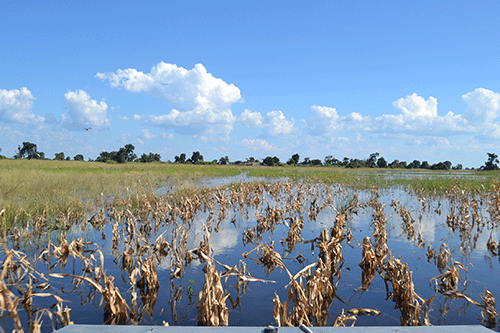KABBE - An assessment has been undertaken in the Zambezi region’s flood-prone Kabbe area to determine the number of farmers who are affected, as they had their fields flooded in various villages.
The Zambezi Regional Council’s disaster risk management team, in conjunction with health officials and the school inspectorate, undertook a weeklong field visit to assess the flood situation in terms of access to education, health and effects on local farmers.
However, the team is yet to meet and compile a report which maps the way forward, based on the findings of the affected families and schools.
Kabbe South constituency councillor John Likando was not available to shed more light on the latest flood situation.
Zambezi governor Lawrence Sampofu said schools have been informed that if the floods persist, the options left will be to close schools or relocate learners and teachers.
“There is a team which went to assess the situation. It depends on the parents. If they don’t want to relocate, we will close the schools. We ask parents to escort their children to school. We don’t want to lose lives. No school has been closed yet,” he noted.
Local farmer Lawrence Shinkisha, whose crop field has been destroyed by floods, was despondent.
“Our crops are submerged. We foresee a poor harvest. We don’t have food to eat. It is really difficult. Government must come to our aid, and provide boats so that we can cross the floodwater to access basic needs and services,” he said.
Asked why they are reluctant to move permanently to higher ground, Shinkisha observed that villages in the floodplains are the only places they have known as home
over centuries. “Most of us decided not to leave our homes because we were born and bred here. These areas form part of our culture and tradition,” he reasoned.
Lumba Kulatau at Ivilivinzi said “our crops have been spoiled, and we don’t foresee a bumper harvest at all. We fear there could be drought. We are requesting the government to come to our rescue with food items and mosquito nets to prevent contracting malaria.”
Former national examination director Cavin Nyambe, who is a resident of Nsundwa village in the floodplains, said locals did not harvest anything.
“At my village, we had about two hectares, and it was flooded while the maize was fresh and not even dry. Most cattle have been relocated to upper land. We are faced with challenges of space for grazing. There is not enough land for all the animals from the floodplains,” Nyambe said before he loaded a banana boat from Luhonono back to his village. Frederick Simataa, a 74-year-old senior citizen of Mbalasinte, explained that this year’s floods are fast and high, compared to past years.
He said since crops are submerged, they foresee a shortage of food, and will need urgent intervention from the government to provide food to the affected families.
“If the water levels increase, then we will face more challenges in terms of accessing services such as health,” he added.
He mentioned that burials, weddings, pension and social grant payments, and access to medical facilities have also been affected negatively by the floods.
“During funerals, we organise as family members, and use banana boats to collect the bodies of our loved ones. It’s really a challenge as water transport is expensive,” he continued.
Another farmer, Kamwi Nchindo, said “we will need food assistance from the government.” Farmers said relocating their livestock to higher grounds was a challenge as floodwaters moved so fast, and some animals couldn’t manage to cross the floodwater.
Most villagers have since relocated to higher grounds, which are mostly at the schools. “We left our houses behind. Some of our livestock die during the relocation process as they get attacked by crocodiles,” another farmer narrated.
Local farmers in the Kongola constituency also fear drought, as that part of the region did not receive good rainfall.
This was confirmed by Kongola councillor Benett Busihu. “Initially, the rain started very well. Farmers tried to tilt their fields and all of a sudden when crops grew, the rain stopped. If maize does not get enough water at an early stage, they wilt and die. We won’t have a bumper harvest, especially for our maize producers who are the majority, if rain doesn’t come,” Busihu indicated.
–anakale@nepc.com.na


